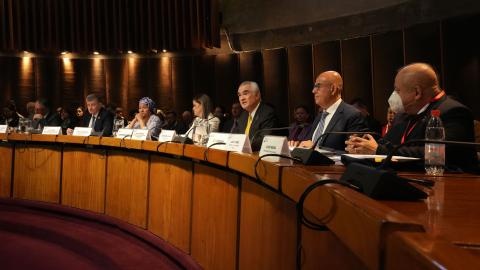Announcement
After five days of debates on globalization and regional Development, the 29th Session of the Economic Commission for Latin America and the Caribbean (ECLAC) closed this afternoon. The meeting ran from 6 to 10 May. José Antonio Ocampo, Executive Secretary for the Economic Commission for Latin America and the Caribbean (ECLAC) and Celso Lafer, Brazil's Foreign Affairs Minister, closed the session.
Delegates from 28 member states and two associate members of ECLAC approved 11 resolutions setting the agenda for the Commission's work in several areas. They also accepted an invitation from the Associated Free State of Puerto Rico, which offered to host the 30th session in 2004.
The Brasilia Resolution approved the pro-active agenda proposed by ECLAC to face the challenges of the current phase of globalization. It also underlined the importance of national strategies to consolidate democracy; the region's possible contribution to building global institutions that cushion against external vulnerability and expand national policies' room to manoeuvre; and the concept of regional and sub-regional bodies as important instances for cooperation and analysis.
The same resolution requests that this UN Commission deepen its work on the following issues:
-
Education, science and technology, highlighting the importance of developing national and regional systems for innovation that associate public and private efforts.
-
Social protection, aiming to complement public and private systems that permit broader coverage and make solidarity a reality.
-
Counter-cyclical macroeconomic management, bringing together measures at the national, sub-regional and regional levels with the changes required in the international sphere.
-
Productive chains, defining policies oriented to developing and deepening them and to forming productive clusters.
-
Sustainable development and competitiveness, with special attention to the economic valuation of environmental goods and services, along with improving conditions for market access to same.

